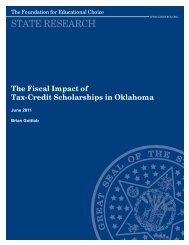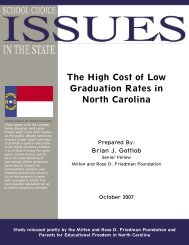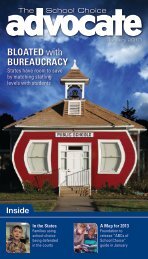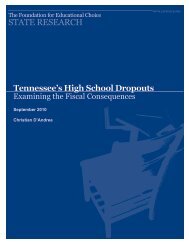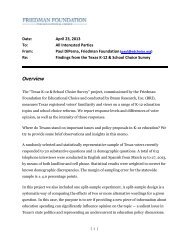Survey Memo - The Friedman Foundation For Educational Choice
Survey Memo - The Friedman Foundation For Educational Choice
Survey Memo - The Friedman Foundation For Educational Choice
You also want an ePaper? Increase the reach of your titles
YUMPU automatically turns print PDFs into web optimized ePapers that Google loves.
Independents (37%). Nearly half of respondents (47%) living in middle-income<br />
and high-income households chose a private school as first option. A significantly<br />
lower level of respondents (33%) in lower-income households (< $50,000)<br />
selected a private school.<br />
Roughly equal numbers of respondents in our survey prioritize a “better<br />
education” and “individual attention” (12% each impression) as the key<br />
attribute they are looking for in the selection of their preferred school.<br />
<strong>The</strong> next most important attribute, as suggested by 10% of all<br />
respondents, is “socialization” among other peer students and kids.<br />
See Question 8<br />
Some caution. <strong>The</strong>se characteristics appear to be a higher priority over others on the<br />
list. However, any of these qualities may or may not attract more urgency as a second<br />
or third priority, which we do not explore in our survey.<br />
Tennessee voters are much more likely to favor charter schools (61%),<br />
rather than oppose such schools (18%). <strong>The</strong> net support for charter<br />
schools is very large (+43 net percentage points).<br />
See Questions 9 and 10<br />
Tennessee registered a very large positive net score (+43 net) supporting charter<br />
schools. <strong>The</strong> enthusiasm is also quite positive (+14 intensity). In other words,<br />
voters are more likely to say they “strongly favor” charter schools (22%)<br />
compared to those who say they “strongly oppose” (8%).<br />
Charter schools enjoy majority support across all examined demographic groups.<br />
However, where a voter lives can point to some differences in support level. <strong>For</strong><br />
example, urban voters (73%) are much more favorable toward charter schools<br />
than voters living in small towns (58%) and rural areas (59%).<br />
[ 7 ]



